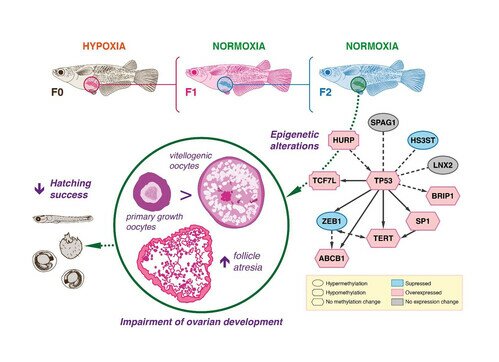教大研究揭示缺氧影响全球鱼类生态永续

Low oxygen levels in water (hypoxia) pose a significant threat to marine and freshwater ecosystems worldwide, as highlighted in the latest research findings of The Education University of Hong Kong (EdUHK) in an article titled “Low oxygen levels affect reproductive function in female fish – across multiple generations”, featured in Science for Environment Policy (Issue 536). This novel finding shows that hypoxia not only impairs reproduction in female fish (Oryzias melastigma), but the adverse effects can be passed on to their descendants in subsequent generations, posing a long-term threat to the sustainability of natural fish populations around the world.
“Even offspring that has never been exposed to hypoxia is affected,” emphasised Professor Rudolf Wu Shiu-sun, principal investigator of the study and Research Chair Professor of Biological Sciences at EdUHK. For the first time, his study found that this widespread environmental problem can cause reproductive impairments that persist across generations.
The study investigated the transgenerational and epigenetic effects of hypoxia on marine medaka, a model marine fish. First-generation fish were split into two groups and for one month, were exposed to either normoxia (normal oxygen levels of 5.8 mg/L) or hypoxia (low oxygen levels of 1.5 mg/L). Embryos produced by the first generation were collected within one hour of fertilisation. Half were reared in hypoxia for two generations and half were returned to normoxia and kept for another two generations.
The results show that hypoxia caused two major distortions in ovarian development: follicle atresia (the breakdown of follicles due to cell death) and retarded oocyte development (a greater number of primary oocytes but fewer vitellogenic oocytes – those containing egg yolk), leading to a significant reduction in hatching success. Most importantly, impairment of ovarian development and reduction of hatching success were also found in the third generation of the transgenerational group though they had never been exposed to hypoxia. The observed reproductive impairment was further supported by epigenetic changes in the related genes.
Professor Wu explained that the results, coupled with findings in his earlier studies, indicate that hypoxia can disrupt sex hormones, resulting in birth defects and reproduction impairment in male fish over several generations, provide strong evidence that hypoxia can affect the sustainability of fish populations in their natural environment. He warned that it is crucial for policy makers and the general public to be aware of the impending effects of climate change, which will exacerbate the problem of hypoxia on aquatic ecosystems and fish populations, and call for corresponding strategies for fisheries management and conservation.



